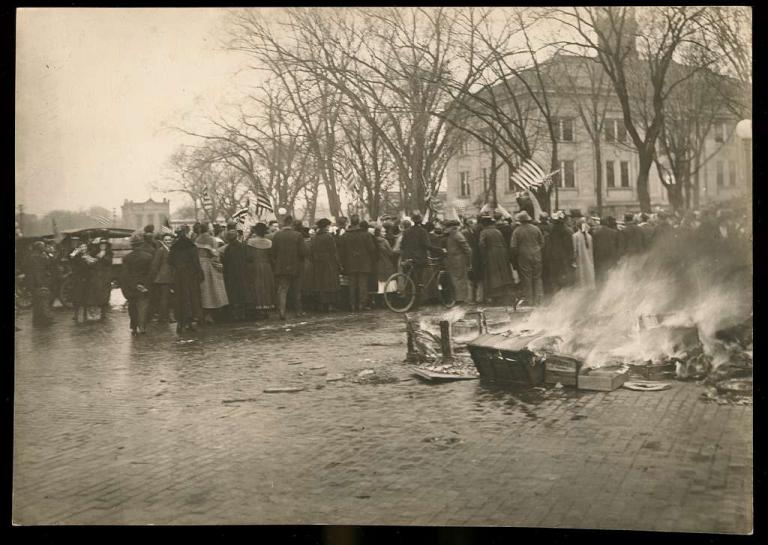There are many different ways to infringe religious liberty–outlawing a religion and punishing its adherents with imprisonment or death (as is happening to Christians in many Islamic countries); co-opting a religion by forcing it to change in line with the government-mandated ideology (as is happening in China); restricting what churches and religious people are allowed to do (as some want to happen in the United States).
An interesting example of governments using the force of law to regulate the internal practices of churches took place here in America, and the targets were mainly Lutherans.
Part of the history of us Missouri Synod Lutherans, a church body that was started by German immigrants fleeing persecution from the state church, is how congregations switched from the German language in worship to English, due to the patriotic anti-German sentiments of Americans during World War I. But what I didn’t realize is that much of that pressure came, not just from the public’s zeal against the enemy, but from state governments that actually outlawed the use of foreign languages in worship and preaching.
And it wasn’t just German that was outlawed, but also Swedish, Norwegian, Danish, Czech, Dutch, and other languages used in immigrant churches. Since Catholics at the time used Latin in worship, they weren’t affected as much as us Lutherans.
I learned all of this from historian Chris Gehrz and his post The American Christians Who Couldn’t Worship in Their Own Language at The Anxious Bench, a Patheos blog written by an array of Christian historians.
The early years of the 20th century were already rife with anti-immigrant beliefs, with both the Republican Teddy Roosevelt and the Democrat Woodrow Wilson warning against “hyphenated Americans,” accusing them of disloyalty to their new country by keeping up ties with the old country. Then World War I broke out. Whereupon twenty states officially put limits on any language but English.
In Minnesota, home to many of those German and Scandinavian immigrants, the governor started a Commission of Public Safety that reviewed foreign-language newspapers, censored German textbooks, required public schools to teach in English, and investigated the entire city of New Ulm, to this day a stronghold of the Wisconsin Evangelical Lutheran Synod, targeting particularly the president of Martin Luther College. But Minnesota didn’t close parochial schools or regulate the language used in worship.
Other states, though, did. Here in Oklahoma, one county resolved that “since God almighty understands the American language, address Him only in that tongue.” Nebraska forbade the use of any language other than English in religious instruction, Sunday Schools, and sermons. In Iowa, the governor issued the “Babel Proclamation” requiring that English be used in all schools, conversations, and speeches, including sermons. The governor acknowledged that Americans are guaranteed the freedom of religion, but maintained that “this guaranty does not protect him in the use of a foreign language when he can as well express his thought in English.” As for those who cannot speak English, they can worship at home.
The restrictions remained even after the war. Finally, in 1923, the U.S. Supreme Court overturned Nebraska’s conviction of a Missouri Synod teacher and declared religious language restrictions unconstitutional.
First-generation immigrants, especially the older ones, often cannot speak the language of their new country. So the language restrictions directly interfered with their ability to worship God and to hear His Word. Second-generation immigrants usually learn the new language, and by the third generation, many cannot even speak the language of the old country.
In the Lutheran Church Missouri Synod, after their Supreme Court victory, congregations continued–voluntarily–to switch to the English language. Though some worried that Lutheran theology depends on the German language–after all, there were few English translations of key theological and ecclesiastical texts–in time the assimilation to English proceeded, especially as congregations started reaching out to non-Germans.
Generally, churches would add an English service to their German offerings. Eventually, that would become the main service, with the German service held only occasionally. As late as the 1980s, when we lived in Wisconsin, where ethnic identity remains pretty strong, our church would hold at least one German service per year, usually at Christmas.
But when governments presumed to tell Christians what language they were allowed to worship in, and dictating to pastors what language they had to preach in, that was a major assault on religious liberty. These laws impacted other church bodies as well, but I’m proud to learn that my own denomination stood up for religious liberty at the Supreme Court–as it has been doing recently–way back then as well.
Photo: Burning German textbooks in Baraboo, Wisconsin (1918), via Picryl, public domain.












